The 2022 Nova Scotia Culture Survey (PDF) measured Nova Scotians' attitudes about culture and their cultural identities. An inaugural Nova Nova Scotia Culture Survey was conducted in 2015, with additional surveys conducted in 2016, 2018, and 2020. New sections and questions were added on equity, diversity, inclusion, racism, as well as the impacts of COVID-19.
Research Reports
The Department of Communities, Culture and Heritage engages in research about the economic, social and intrinsic aspects of culture. Following are reports about culture conducted or commissioned by CCH or produced in partnership with others.
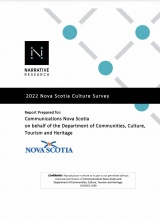
Nova Scotia Culture Survey 2022
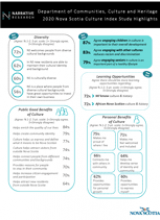
Nova Scotia Culture Index 2020
The Nova Scotia Culture Index (NSCI) (6.4MB PDF) is a social research tool that provides insight into how average Nova Scotians participate in, are aware of, and value major aspects of culture in the Province. An initial Nova Scotia Culture Index was conducted in 2015, with additional surveys conducted in 2016 and 2018. As citizens’ response to culture changes, the Nova Scotia Culture Index will continue to measure, track, compare and analyze the differences over time.
2020 NS Culture Index Highlights Infographic (2.1MB PDF)
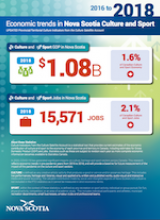
Provincial/Territorial Culture Indicators 2018
Data released by Statistics Canada in October 2020, shows that the economic contribution of culture and sport in Nova Scotia has continued to grow since 2010. In 2018, culture and sport together contributed $1.08 billion to the Nova Scotian economy and provided 15,571 jobs. Sport contributed $134 million to the Nova Scotian economy in 2018, a 1.6% increase from 2016 to 2018, and provided 2,455 jobs across the province. Culture contributed $943 million, up 5.1% from 2016 to 2018, and provided 13,116 jobs.
The Provincial/Territorial Culture Indicators report shows the economic contribution of sport and culture in every province and territory in Canada. Nova Scotia uses this data to inform culture-related policies, programs and services for all Nova Scotians.
Note: Statistics are subject to revision each year as more complete economic information becomes available to Statistics Canada. As such, the 2016 to 2018 Culture indicators presented here represent a new methodology and statistics are not directly comparable to previous years.
Economic trends in Nova Scotia Culture and Sport Highlights Infographic (318KB PDF)

Nova Scotia Data from the Canadian Digital Economy Survey 2018
This Nova Scotia Digital Economy infographic features data from the Canadian Digital Economy Survey (DES). The DES is part of a larger effort to better understand how individual consumption and purchasing patterns are changing in an increasingly digitalized world.
The survey was conducted by Statistics Canada and covers the period of Canadians’ activities from July 2017 to June 2018. It covers the use and purchase of various digital products, defined as goods or services that were ordered and delivered online (in a digital format).
Nova Scotia Digital Economy infographic (96KB PDF)
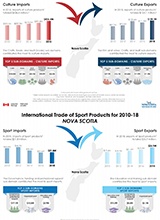
Trade of Culture and Sport Products (2010-2018)
Trade of Culture and Sport Products (TCSP) provides measures of the international and interprovincial trade of goods and services attributed to both culture and sport, inclusive of the arts and heritage.
This data was prepared by Statistics Canada and complements the Canadian Culture Satellite Account (CSA) and the Provincial and Territorial Culture Satellite Indicators (PTCI) by providing additional information regarding the activities of culture and sport in Canada, the provinces and territories.
At the national level, the TCSP provides data on trade imports and exports for numerous top trading partners. The majority of Canada’s imports and exports remain with the United States, the European Union, and China.
Trade of Culture Products (355KB PDF)
Trade of Sport Products (299KB PDF)
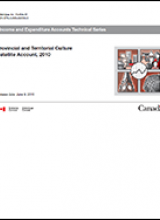
Provincial/Territorial Culture Satellite Account 2010
Released in June, 2015, and based on economic data from the 2010 year, this report provides Provincial and Territorial data from the Culture Satellite Account. This report was prepared for the Federal- Provincial-Territorial Table on Culture (FPTTC) and its associates by the staff of the Satellite Accounts and Special Studies Section, National Economic Accounts Division, Statistics Canada. Review the full report or a summary of the data from Statistics Canada.
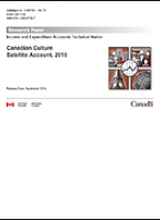
Canadian Culture Satellite Account Report 2010
This report articulates the Canadian Culture Satellite Account (CSA) developed by Statistics Canada. The Canadian CSA provides measures of the economic importance and activity of culture, arts, heritage and sport in Canada in terms of output, gross domestic product and employment, for reference year 2010.
The report was prepared for the Federal- Provincial-Territorial Table on Culture and Heritage (FPTTCH) and its associates by the staff of the Satellite Accounts and Special Studies Section, National Economic Accounts Division, Statistics Canada.
Since the beginning, Nova Scotia has been a funding partner in the development of the Culture Satellite Account and remains actively involved as a leader of the FPTTCH’s Culture Statistics committee.
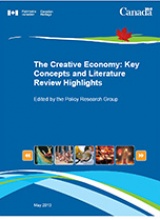
The Creative Economy: Key Concepts and Literature Review Highlights 2013
The creative economy continues to emerge globally, and holds exciting opportunity for Nova Scotia. This recent literature review suggests that the creative economy is revitalizing manufacturing, services, retail, and entertainment industries across the world. It is also changing the work people do, what they want to do, and where they want to live. Prepared as a common reference of basic information on the creative economy for the Creative Economy federal-provincial-territorial working group (Canada), this document outlines key definitions and models that are informing policy decision-making around the world and is based on a reproduction of selected text and discussion from two recent government-sponsored literature reviews on the creative economy, one supported by the Government of Nova Scotia and the other supported by the Government of Canada.
The Creative Economy: Key Concepts and Literature Review Highlights (PDF 1.8 MB)
